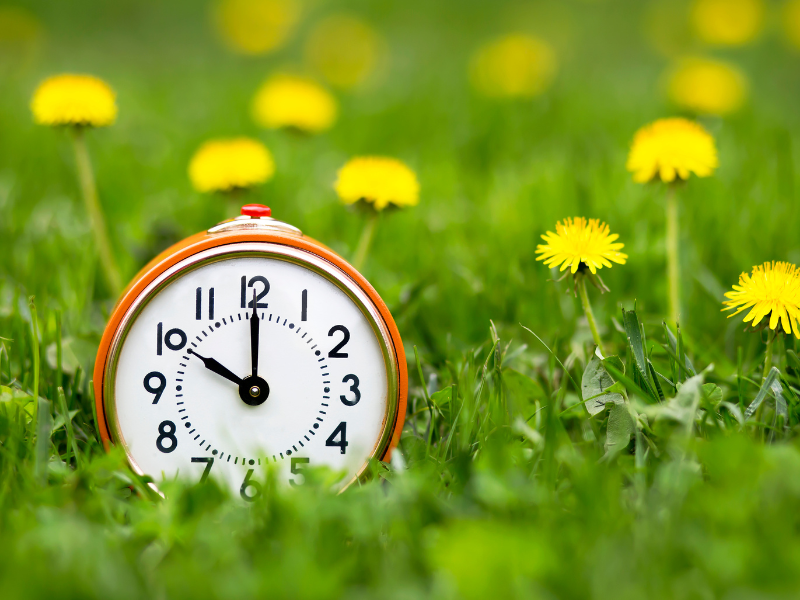Mastering the time change:
Our tips for managing this transition with ease

Spring is back! You can feel it: the days are getting longer and the Easter chocolates are out.
But spring also means a time change!
It will take place on the night of Saturday March 30 to Sunday March 31, 2024. At 2 o’clock, your watch hands will move forward by one hour.
Changing time can be very disruptive to our biological clock, causing sleep disorders, appetite problems, concentration problems, mood swings…
With summer time fast approaching, are you worried about sleep deprivation? It’s possible to sleep well despite the time change.
Discover all our tips for adapting to this transition period:
Forget sleeping in:
If you sleep in longer and get up late, the time difference may disrupt your sleep on Sunday night, leading to persistent fatigue the next day. By waking up at a normal time on Sunday morning, you make it easier to fall asleep that evening, avoiding losing an extra hour’s sleep and being tired at work on Monday.
Take advantage of natural light:
To get your day off to a good start, there’s nothing like natural light. It’s an effective way of synchronizing yourself with the new time zone. By catching the first rays of sunlight, you stimulate your biological clock and promote a harmonious adjustment to this transition.
As a complement to daylight, light therapy offers an effective alternative for maximizing your exposure to light. This technique involves using a special lamp emitting intense light, reproducing the benefits of natural light. By incorporating a light therapy session into your day, you reinforce the beneficial effects of daylight, which can be particularly useful on cloudy or dark days.
Switching off screens:
Smartphones, tablets and laptops are real sleep disruptors. Their intensive use delays our ability to fall asleep. What’s more, the blue light emitted by these screens disrupts our biological clock, signalling to our brains that it’s still time to be awake. That’s why, as we make the transition to summer time, it’s even more important to limit our exposure to screens in the evening. Instead of succumbing to the temptation of an addictive series, opt for a good book. Reading promotes relaxation and naturally prepares the body and mind for sleep.
Get active:
When the weather’s nice, it’s essential to get some exercise to activate every cell in your body and energize you. In fact, exercise releases endorphins, the happy hormones that promote relaxation and improve your mood. After a workout, you’ll feel fresher and more relaxed. However, be careful not to exercise too late in the day, as this could have the opposite effect and disrupt your sleep. Instead, opt for physical activity early in the day or early afternoon to maximize its benefits.
Give yourself a Power Nap :
If you feel a drop in energy during the day, give yourself a micro-nap to recharge your batteries. Opt for a short nap of no more than 15 to 20 minutes to reap the benefits without falling into a deep sleep. In fact, a micro-nap enables you to recover quickly and efficiently, giving you renewed energy and alertness to pursue your activities with dynamism.
No stress :
After the time change, it’s normal for our sleep-wake rhythm to be disturbed for a few days, or even a few weeks. To ease this transition, it’s essential to put things into perspective and not let yourself be overwhelmed by stress. Give yourself time to relax and take care of yourself. Practice activities that promote relaxation, such as yoga or meditation sessions.
Create a new routine :
The time change offers a valuable opportunity to reorganize our daily routine. It’s the ideal time to integrate new habits into our lifestyle and explore new activities that are beneficial to our well-being.